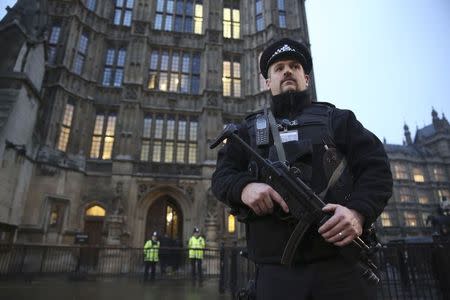UK terrorism watchdog criticizes new security proposals
LONDON (Reuters) - Britain's terrorism watchdog has criticized the government's proposed new security laws, describing some of the measures as an "announcement waiting for a policy". A bill introduced by Home Secretary Theresa May on Wednesday is designed to crack down on Britons wanting to travel to Syria and Iraq to fight, and to prevent veterans of those conflicts from returning unless they agree to comply with the authorities under Temporary Exclusion Orders. David Anderson, Britain's independent reviewer of terrorism laws, said he was concerned about the judicial checks for the latter proposal. "I sense that this power was an announcement waiting for a policy," he told parliament's Committee on Human Rights, adding the powers appeared less dramatic than when first announced by Prime Minister David Cameron shortly after Britain's terrorism level was raised to its second-highest rating. He added: "The concern I have about this power, and the central concern about it, is where are the courts in all of this?" Some 500 Britons are thought to have traveled to Syria and Iraq, with about 250 believed to have returned home. West Midlands Police said officers had arrested a man, 20, and a 19-year-old woman from Walsall, central England, "on suspicion of Syria-related terrorism offences" at Heathrow Airport on Tuesday as they got off a flight from Turkey. Anderson said some of the new policies were well thought through, well worked out and well prepared but "others not so much". The bill also seeks to tighten aviation security, strengthen the government's highly criticized counter-radicalization program and make it easier for the security services to track individuals of concern online. The measures come the day after Prime Minister David Cameron criticized U.S. Internet companies for failing to do enough to tackle terrorism in the wake of a report on the murder of British soldier Lee Rigby in London last year. "These powers are essential to keep up with the very serious and rapidly changing threats we face," May said in a statement. (Reporting by Michael Holden; editing by Stephen Addison)



